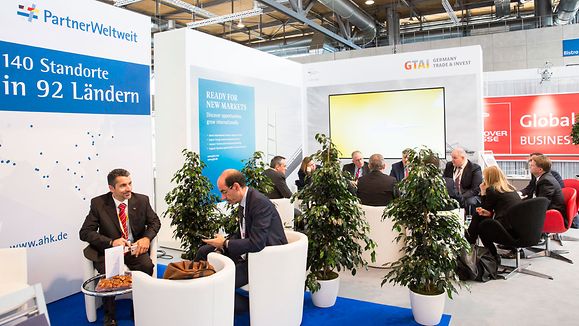domestic data center power capacity by 2030
Your company is already operating in Germany and you would now like to export worldwide?
Key Facts
Data Center Facts & Figures
Market Demand
Demand for cloud services, big data analytics and AI technologies continues to drive growth in the data center market.Energy Efficiency and Sustainability
The German Energy Efficiency Act (EnEfG) obliges data centers to implement energy and environmental management systems, make use of generated waste heat and increase the use of renewable energy sources in the power supply.Stable Infrastructure
Germany’s data centers enjoy reliable power supply and advanced telecommunications networks with excellent connectivity to the EU market.High Security Standards
Data centers in Germany conform to some of the most stringent data protection and security requirements in the world. Adherence to strict data protection legislation and implementation of
International industry standards pay testimony to the sector’s commitment to security and delivery of service.Access to European Markets
Germany’s central location at the heart of Europe provides easy access to key data center hubs in Germany and beyond.
Opportunities
Germany stands out as one of Europe’s most dynamic data center markets, offering robust opportunities for investors.
Growth Drivers:
AI and Digitalization
Rising demand for AI and cloud services is fueling infrastructure expansion.
The generative AI segment is forecast to grow by more than 560 percent by a total of USD 16.5 billion during the period 2025 to 2031. After a tenth consecutive increase, market size is predicted to reach a new high of USD 19.5 billion in 2031.
Turnover in the public cloud market is forecast to top more than EUR 35.4 billion in 2025.
Software-as-a-Service is forecast to generate market volume of almost EUR 18.2 billion in 2025.
Revenue is forecast to grow at a CAGR of 16.7 percent during the period 2025 to 2029, generating market volume of almost EUR 65.7 billion in 2029.
Germany’s public cloud landscape is showing increased interest in sustainable solutions and data protection-compliant offerings.
Government Incentives
Supportive policies and funding for digital and energy-efficient infrastructure.
High Connectivity
With 93%+ internet penetration, demand for low-latency services is surging.
Investment Opportunities:
Colocation Services
With a CAGR of 15.7 percent, colocation services are expected to rise to USD 4.2 billion by 2030, driven by enterprise and hyperscaler demand.
Green Data Centers:
Facilities using renewable energy and efficient cooling systems are in high demand.
Edge Infrastructure:
Internet of Things and 5G growth is creating demand for localized, low-latency data centers.
Germany’s edge computing market size is estimated at over EUR 1.2 billion, with a CAGR of over 30 percent annually for the period 2025 to 2031.
Market Growth Drivers
- Industrie 4.0and Industrial Internet of Things
- Smart Cities and autonomous e-vehicles
- AR/VR-applications
- 5G-rollout and decentralized data processing (Germany Edge Computing Market (2025-2031) | Companies & Share)
AI-Optimized Facilities
Data centers equipped with GPU clusters and high-density computing are increasingly valuable.
Business Environment
Data Center Hotspots in Germany
Data Center Growth
Data center capacity is set to more than double capacity according to current forecasts. Additional data center capacity totaling 1,700 megawatts is expected, with over 1,300 megawatts planned outside the city limits of Frankfurt. Beyond the Frankfurt/Rhine-Main and Berlin-Brandenburg regions, other major data center locations are the greater Munich area, Cologne-Düsseldorf and the Hamburg metropolitan region.
Frankfurt/Rhine-Main Region
Data centers have to date been concentrated in the Frankfurt/Rhine-Main region, the largest data center location in Germany. Over 30 percent of total server room and data center capacity is located here. The region also has a share of over 60 percent of colocation market capacity.
Berlin-Brandenburg Region
The Berlin-Brandenburg region has become the second largest location in Germany in recent years. Between 2017 and 2023, data center capacity has more than tripled. Until recently, there were only a few data centers in the Berlin-Brandenburg region. The colocation market in particular was barely developed. This has changed rapidly in the last three years. Data center capacities are expected to increase more than fivefold in the coming years. Berlin-Brandenburg already occupies sixth place in Europe after the FLAP (Frankfurt, London, Amsterdam and Paris) markets and Dublin. The Berlin-Brandenburg capital region is also becoming increasingly interesting for international tech companies. Planned investments with IT connection capacity of almost 900 MW are planned in the coming years



